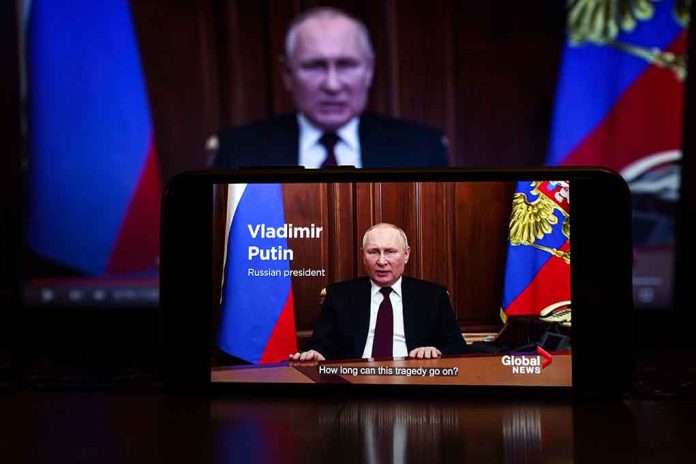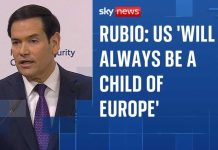
Indonesia commits $2.29 billion investment fund to Russia as President Prabowo deliberately snubs G7 summit to forge deeper strategic alliance with Putin.
Key Takeaways
- Indonesia and Russia signed a “declaration on strategic partnership” during high-level talks in St. Petersburg, cementing their growing bilateral relationship.
- A massive 2 billion euro ($2.29 billion) investment fund agreement was established between Indonesia’s Danatara fund and the Russian Direct Investment Fund.
- President Prabowo chose to meet with Putin over attending the G7 summit, signaling Indonesia’s shift toward non-Western alliances.
- Russia is supporting Indonesia’s accession to BRICS, further strengthening ties between the nations in defiance of Western isolation efforts.
- The partnership encompasses multiple sectors including defense, agriculture, space technology, energy, and potential nuclear power development.
Growing Alliance Between Jakarta and Moscow
In a significant development that underscores the shifting global alliances, Indonesian President Prabowo Subianto and Russian President Vladimir Putin have formally pledged to deepen their nations’ bilateral relations during high-level talks in St. Petersburg. The meeting, which included signing a “declaration on strategic partnership,” represents a deliberate pivot by Indonesia away from Western-dominated alliances. This strategic realignment comes as Russia continues to expand its influence throughout the Global South, effectively countering Western attempts to isolate Moscow following its military operations in Ukraine.
The timing of this summit is particularly telling, as President Prabowo chose to skip the G7 meeting of Western powers in favor of strengthening ties with Russia. This decision has raised concerns among Western nations about Indonesia’s geopolitical priorities but aligns perfectly with Prabowo’s stated policy of “assertive non-alignment” – a strategy that aims to reduce Indonesia’s dependence on any single global power. The approach mirrors the growing sentiment among developing nations that Western institutions no longer serve their interests effectively.
Multi-Billion Dollar Investment and Economic Cooperation
At the center of this budding relationship is a substantial economic partnership. During the summit, officials signed an agreement between Indonesia’s sovereign wealth fund, Danatara Indonesia, and the Russian Direct Investment Fund to create a 2 billion euro ($2.29 billion) investment fund. This massive financial commitment will support joint projects across various sectors, including infrastructure, energy, and technology development. The investment signals Indonesia’s serious intent to build long-term economic ties with Russia despite ongoing Western sanctions.
“My meeting with President Putin today was intense, warm, and productive. In all fields of economics, technical cooperation, trade, investment, agriculture – they all have experienced significant improvements,” said Prabowo, President of Indonesia.
Beyond direct investment, both leaders discussed potential free trade agreements between Indonesia and the Eurasian Economic Union, Russia’s answer to the European Union. Such arrangements would further insulate both nations from Western economic pressures while creating alternative markets for their goods. Agricultural cooperation featured prominently in talks, with Indonesia seeking food security solutions and Russia looking for new markets for its agricultural exports amid Western sanctions.
Military and Strategic Cooperation
The partnership extends well beyond economics into military and strategic cooperation. Last year, Russia and Indonesia conducted their first joint military drills in the Java Sea, highlighting the growing defense relationship between the two nations. As a former general, President Prabowo has shown particular interest in military-technical cooperation with Russia, likely seeing Moscow as a valuable alternative to Western defense suppliers who often attach political conditions to their sales.
“Our relations with Indonesia are developing steadily. Trade turnover is growing. We have good prospects in a number of promising and very interesting areas of cooperation. This includes agriculture, space, and energy, as well as military-technical cooperation. Our interaction is very great, and it is growing,” said Vladimir Putin, President of Russia.
The personal affinity between Prabowo and Putin cannot be overlooked. Both leaders share similar views on state sovereignty and resistance to Western hegemony. Prabowo’s multiple visits to Russia, even before assuming the presidency, demonstrate his long-standing view of Russia as a critical strategic partner. This alignment of worldviews provides a solid foundation for the growing partnership, particularly as both nations seek to assert greater independence in a multipolar world order.
BRICS Membership and Global Realignment
Another significant dimension of this partnership involves Indonesia’s entry into the BRICS consortium, with Putin acknowledging Indonesia as a full member during the talks. This move positions Indonesia within an increasingly influential bloc of non-Western powers that includes Brazil, Russia, India, China, and South Africa. Membership in BRICS offers Indonesia access to alternative financing mechanisms, such as development funds that operate outside the Western-dominated World Bank and IMF systems, which have consistently failed to address the needs of developing nations.
Energy cooperation, particularly in nuclear power, represents another frontier for Russian-Indonesian relations. Indonesia is actively exploring nuclear energy options to meet its growing power needs while reducing carbon emissions. Russia’s advanced nuclear technology and willingness to share it without the political strings attached by Western providers makes it an attractive partner. This potential collaboration could fundamentally transform Indonesia’s energy sector while creating long-term dependencies that further cement the strategic partnership.




